
Graham Thomas Parker is an English singer-songwriter, who is best known as the lead singer of the British band Graham Parker & the Rumour.

John Nommensen Duchac, known professionally as John Doe, is an American singer, songwriter, actor, poet, guitarist and bass player. Doe co-founded LA punk band X, of which he is still an active member. His musical performances and compositions span rock, punk, country and folk music genres. As an actor, he has dozens of television appearances and several movies to his credit, including the role of Jeff Parker in the television series Roswell.
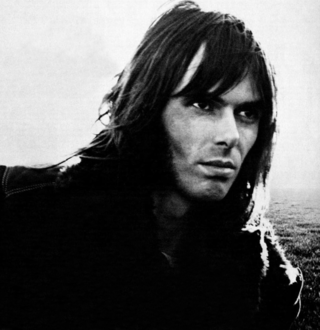
Nicholas Christian Hopkins was an English pianist and organist. Hopkins performed on many popular and enduring British and American rock music recordings from the 1960s to the 1990s, most notably on songs recorded by the Rolling Stones, the Kinks, the Who, the Beatles, the Steve Miller Band, Jefferson Airplane, Rod Stewart, George Harrison, John Lennon, Paul McCartney, Ringo Starr, The Hollies, Cat Stevens, Carly Simon, Harry Nilsson, Joe Walsh, Peter Frampton, Jerry Garcia, Jeff Beck, Joe Cocker, Art Garfunkel, Badfinger, Graham Parker, Gary Moore, and Donovan. He is widely considered to be one of the greatest studio pianists in the history of popular rock music.

Stick to Me is the third studio album by English singer-songwriter Graham Parker and his first group, the Rumour.

The Rumour was an English rock band in the late 1970s and early 1980s. They are best known as the backup band for Graham Parker, whose early records were credited to Graham Parker & The Rumour. However, The Rumour also recorded on their own, releasing three albums: Max (1977), Frogs, Sprouts, Clogs and Krauts (1979), and Purity of Essence (1980).
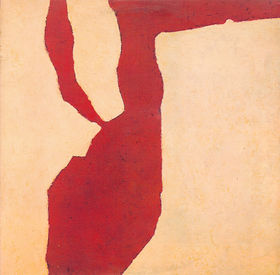
The Up Escalator is an album by Graham Parker and The Rumour and was released on 23 May 1980 by Stiff Records as LP and as cassette. In the USA, the album was released by Arista. Released after Parker's successful 1979 album Squeezing Out Sparks, the album features production by Jimmy Iovine.
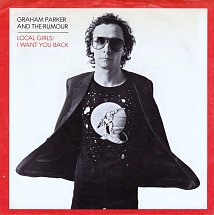
"Local Girls" is a song by British rock musician Graham Parker, recorded with his backing band the Rumour. The song was released on his 1979 album, Squeezing Out Sparks.

Tommy is a soundtrack album by The Who with contributions from numerous artists. The soundtrack was used in the 1975 Tommy film that was based on the original album that was released by The Who in 1969. Pete Townshend oversaw the production of this double-LP recording that returned the music to its rock roots, and on which the unrecorded orchestral arrangements he had envisaged for the original Tommy LP were realised by the extensive use of synthesiser.

Another Grey Area is the first solo album by Graham Parker. It was released in 1982 on the Arista label. The album was produced by Jack Douglas and Graham Parker, and features Nicky Hopkins on acoustic piano.

"Clubland" is a song written by new wave musician Elvis Costello and performed by Costello and the Attractions on their 1981 album, Trust. Written in 1980, the song was performed live in festivals before the album's release. The lyrics, inspired by the band's most recent tour, describe life in nightclubs, while the music includes inspiration from The Police.

Andrew Bodnar is an English bass player who grew up in Clapham, South London. He and drummer Steve Goulding met and began playing together as a rhythm section while still at school. They spent their teenage years auditioning and busking whenever they could, and were gigging around London with a cajun-influenced band called Bontemps Roulez just prior to forming The Rumour in 1975. Bodnar is probably best known for his membership with Graham Parker and The Rumour (1975-1980), for playing the distinctive reggae-flavored bassline on "Watching the Detectives" by Elvis Costello, and for bass playing and co-writing "I Love the Sound of Breaking Glass" by Nick Lowe.

"Mercury Poisoning" is a song written by rock musician Graham Parker and performed by Graham Parker and the Rumour. Inspired by Parker's frustration with his record company, Mercury Records, the song was released as a promotional single by Parker's new label, Arista Records, in February 1979. Because of the song's controversial nature, it was pulled from its planned release as the B-side to Parker's 1979 single, "Protection."

"Discovering Japan" is a song by British rock musician Graham Parker, recorded with his backing band the Rumour. The song was released on his 1979 album, Squeezing Out Sparks.
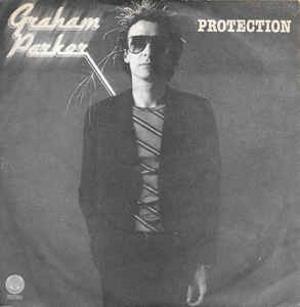
"Protection" is a song by British rock musician Graham Parker, recorded with his backing band the Rumour. The song was released on his 1979 album, Squeezing Out Sparks.
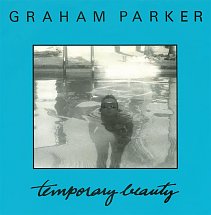
"Temporary Beauty" is a song by British rock musician Graham Parker. The song was released on his 1982 album, Another Grey Area. With lyrics described by Parker as "put-downs", "Temporary Beauty" is a rock song with vocals that Parker noted as an example of his better singing compared to previous albums.

"You Can't Be Too Strong" is a song by British rock musician Graham Parker, recorded with his backing band the Rumour. The song was released on his 1979 album, Squeezing Out Sparks. Written about abortion, the song originated as a country-style shuffle before Parker and producer Jack Nitzsche changed it to a slower acoustic ballad.
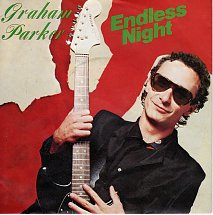
"Endless Night" is a song written by rock musician Graham Parker and performed by Graham Parker and the Rumour for their 1980 studio album The Up Escalator. Originally written for the 1980 film Cruising, "Endless Night" features lyrics about aging in rock 'n' roll. The song notably featured backing vocals from musician and Parker fan Bruce Springsteen.
"Passion Is No Ordinary Word" is a song by British rock musician Graham Parker, recorded with his backing band the Rumour. The song was released on his 1979 album, Squeezing Out Sparks. Written about faking one's emotion, the song features a stripped-down arrangement.

"Wake Up " is a song written by British rock musician Graham Parker and performed by Graham Parker and the Shot. Inspired by Smokey Robinson, the song was crucial in convincing Elektra Records to allow Parker and producer William Wittman to record a full album. The song is also notable for Parker's breathy singing and its lush arrangement.
"Saturday Nite Is Dead" is a song by British rock musician Graham Parker, recorded with his backing band the Rumour. The song was released on his 1979 album, Squeezing Out Sparks. Written about his experiences growing up in suburbia, the song features caustic lyrics and an angry vocal delivery.


















